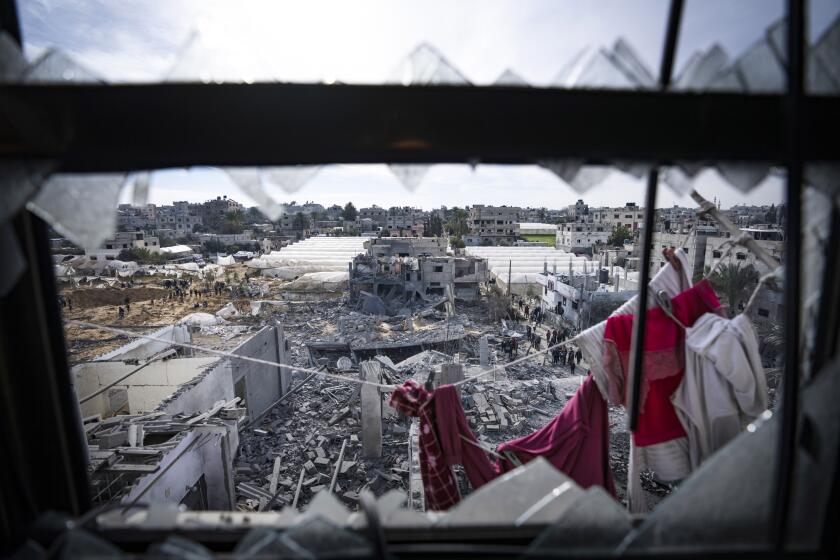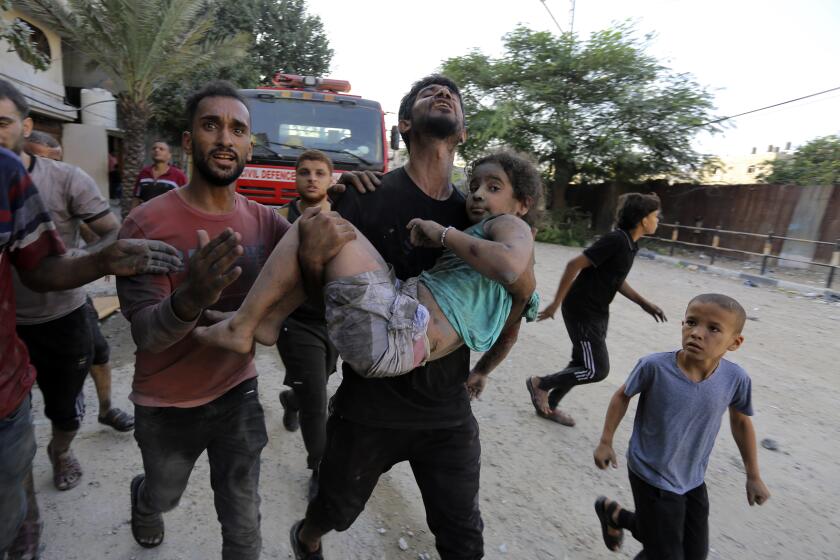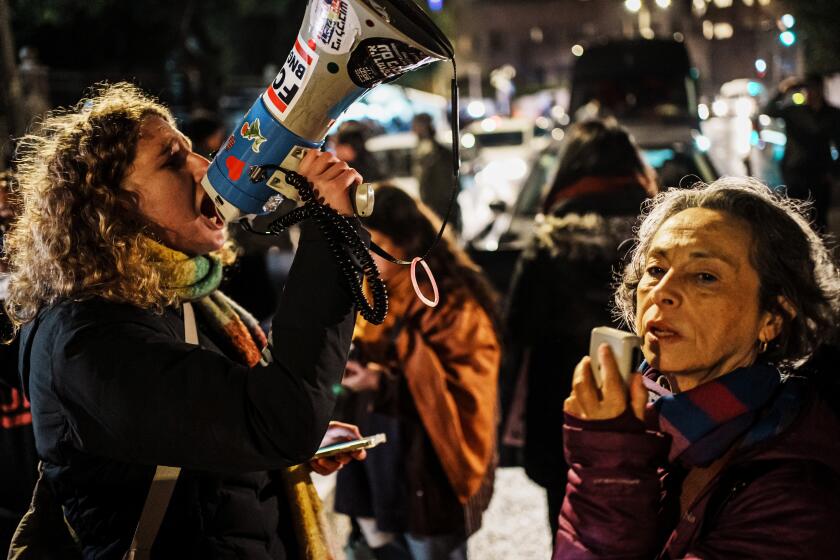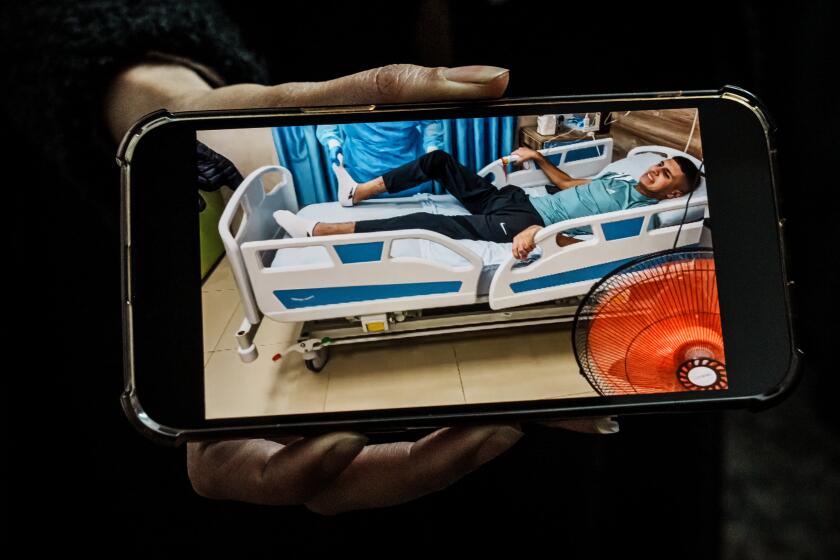Israeli assault on Rafah could be ‘delayed somewhat’ by a cease-fire deal, Netanyahu says
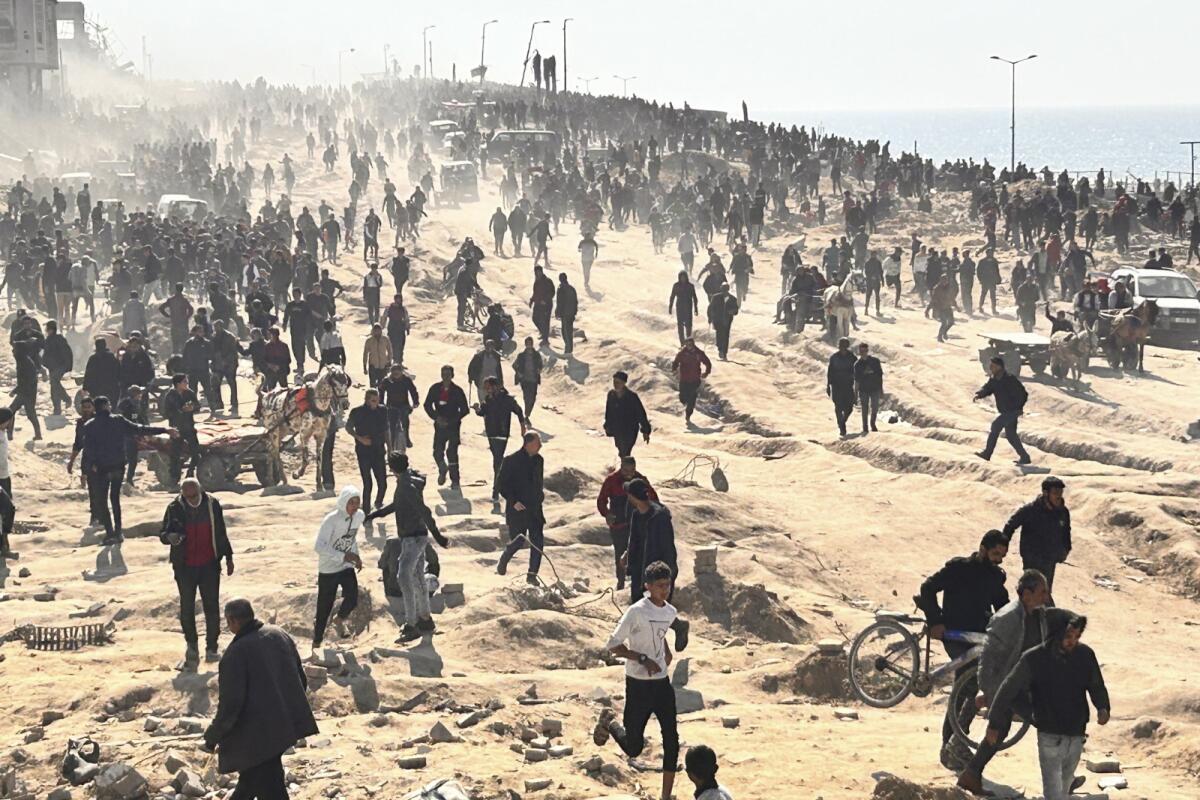
- Share via
TEL AVIV — An Israeli military offensive in the southernmost city of Rafah could be “delayed somewhat” if a deal for a weeks-long cease-fire between Israel and the Hamas militant group is reached, Prime Minister Benjamin Netanyahu said Sunday, while claiming that total victory in Gaza is “weeks away” once the attacks begin.
Netanyahu confirmed to CBS that a deal is in the works, with no details. Talks resumed Sunday in Qatar, Egypt’s state-run Al Qahera TV reported, citing an Egyptian official as saying further discussions would follow in Cairo with the aim of achieving the cease-fire and release of dozens of hostages held in Gaza as well as Palestinians imprisoned by Israel.
Meanwhile, Israel is nearing approval of plans to expand its assault into Rafah, on the Gaza-Egypt border, where more than half the besieged territory’s population of 2.3 million have sought refuge in squalid tent camps, packed apartments and overflowing shelters.
Humanitarian groups warn of a catastrophe, with Rafah the main entry point for aid. The U.S. and other allies have said Israel must avoid harming civilians.
Netanyahu has said he’ll convene the wartime Cabinet this week to approve plans that he says will include the evacuation of civilians.
“Once we begin the Rafah operation, the intense phase of the fighting is weeks away from completion. Not months,” Netanyahu told CBS. “If we don’t have a deal, we’ll do it anyway. It has to be done because total victory is our goal and total victory is within reach.”
Gazans crammed into Rafah along the Egyptian border have no place to escape as Israeli attacks hit ever closer in a final bid to rescue remaining hostages.
He said that four of the six remaining Hamas battalions are concentrated in Rafah.
U.S. national security advisor Jake Sullivan told NBC that President Biden hadn’t been briefed on the Rafah plan and said, “We believe that this operation should not go forward until or unless we see [a plan to protect civilians].”
Heavy fighting continued in parts of northern Gaza, the first target of the Israeli offensive, where the extent of the destruction is staggering.
“We’re trapped, unable to move because of the heavy bombardment,” said Gaza City resident Ayman Abu Awad.
He said starving residents have been forced to eat animal fodder and to search for food in demolished buildings. Northern Gaza has been largely cut off from most aid deliveries since the start of the war.
In nearby Jabaliya, market vendor Umm Ayad showed off a leafy weed that people pick from the harsh, dry soil and eat.
“We have to feed the children,” she said. “They keep screaming they want food. We cannot find food. We don’t know what to do.”
Philippe Lazzarini, commissioner general of the United Nations agency for Palestinians, said they haven’t been able to deliver food to northern Gaza since Jan. 23, adding on X, formerly Twitter, that “our calls to send food aid have been denied.”
Israel said that 245 trucks of aid entered Gaza on Sunday — less than half the amount that entered daily before the war.
Civilian deaths in Gaza have fueled global outrage. But many Israelis, still raw from Hamas’ Oct. 7 attack, have scant interest in the war’s toll on Palestinians.
Toward a limited cease-fire
A senior official from Egypt, which along with Qatar is a mediator between Israel and the Hamas militant group, said Saturday that the draft cease-fire deal includes the release of up to 40 women and older hostages in return for up to 300 Palestinian prisoners, mostly women, children, teens and older people.
The Egyptian official, speaking on condition of anonymity to discuss the negotiations, said the proposed six-week pause in fighting would include allowing hundreds of trucks to bring desperately needed aid into Gaza every day, including the north. He said both sides agreed to continue negotiations during the pause for further releases and a permanent cease-fire.
Negotiators face an unofficial deadline of the start of the Muslim holy month of Ramadan around March 10.
Hamas says it has not been involved in the latest proposal developed by the United States, Egypt and Qatar. But it has said it will not release all of the remaining hostages until Israel withdraws its forces from the territory and releases hundreds of Palestinian prisoners, including senior militants — conditions Netanyahu has vehemently rejected.
Teenage friends Angelina, who is Palestinian, and Adar, who is Jewish Israeli, talk about the Hamas attacks on Israel and Israel’s war on Gaza. ‘It’s OK to disagree.’
But an earlier Hamas proposal outlined an initial phase that resembles the reported draft agreement, indicating the two sides might be able to converge.
Israeli Defense Minister Yoav Gallant on Sunday made clear that a cease-fire deal for Gaza wouldn’t affect the military’s daily low-level clashes with the Lebanese militant group Hezbollah, a Hamas ally.
Anguished wait for hostages’ families
Israel declared war after the Oct. 7 Hamas attack on southern Israel, in which militants killed about 1,200 people, mostly civilians, and took around 240 hostages. More than 100 hostages were released in a cease-fire and exchange deal in November. Around 130 remain in captivity, a fourth of whom are believed to be dead.
Families of the hostages have followed the fits and starts of the negotiations with hope and anguish.
More than three months into the Israel-Hamas war, the families of hostages held in Gaza have grown disillusioned with Israel’s military operations.
“It feels like Schindler’s list. Will he be on the list or not?” Shelly Shem Tov, the mother of Omer, 21, who is held captive, told Israeli Army Radio of her son’s chances of being freed in an emerging deal.
Israel responded to the Oct. 7 attack with a massive air and ground offensive that has driven about 80% of Gaza’s population from their homes, putting hundreds of thousands at risk of starvation and exposure to infectious diseases. The Health Ministry in Hamas-ruled Gaza says 29,692 Palestinians have been killed since the start of the war, two-thirds of them women and children.
The ministry’s death toll doesn’t distinguish between civilians and combatants. Israel says its troops have killed more than 10,000 militants, without providing evidence.
Experts say Israel’s deadly raid on a West Bank hospital may have violated international laws, including a ban on combatants posing as doctors or civilians.
Doctors in Rafah strugle to treat newborns
The war has devastated the territory’s health sector, with less than half of hospitals even partially functioning as scores are killed each day in Israeli bombardment.
At the Emirates Hospital in Rafah, three to four newborns are placed in each of its 20 incubators, which are designed for just one.
Dr. Amal Ismail said two to three newborns die in a single shift, in part because many of their families live in tents in rainy, cold weather. Before the war, one or two newborns in incubators there died per month.
“No matter how much we work with them, it is all wasted,” she said. “There is no health improvement because of the conditions of living in a tent.”
Goldenberg reported from Tel Aviv, Shurafa from Rafah and Magdy from Cairo.
More to Read
Sign up for Essential California
The most important California stories and recommendations in your inbox every morning.
You may occasionally receive promotional content from the Los Angeles Times.
